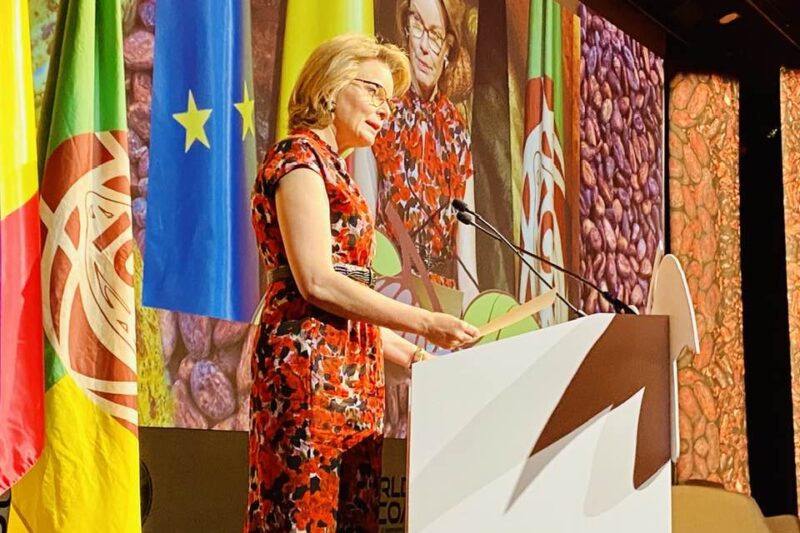Exclusive: Queen Mathilde of Belgium praises World Cocoa Conference farmer income focus

Queen Mathilde of Belgium opens the World Cocoa Conference. Pic; Neill Barston
Queen Mathilde of Belgium offered a heartfelt opening for this year’s World Cocoa Conference, welcoming the event’s core theme of a delivering a living income for farmers, reports Neill Barston.
Her Majesty noted that the core subject area related to the underlying fight against poverty, with paying agricultural workers more with fair prices being a laudable target for the sector.
Proposing models for greater support for cocoa farmers in terms of their earnings will form a key element of this year’s event, which continues until 24 April, attracting more than 1,000 delegates from across the chocolate and cocoa sector.
The Queen told the packed Gold Hall at the Square Meeting Place, that the focus on equitable distribution within the value chain within chocolate and cocoa met with UN sustainable development goals.
Reflecting on her own experiences, she asserted that ‘Prices and sustainability are two sides of the same battle.” in reference to the present market conditions, that have seen cocoa being traded in global Futures markets at around $10,000 a tonne, compared to the current rate of pay at around $2,470 a tonne (upped from less than $2,000 for co-operatives in the region in the past year), which still left workers earning significantly less than on commodities markets.
Queen Mathilde said: “Belgium has always shown great interest in all questions related to the chocolate sector. It was therefore natural that you decided to meet in Brussels to discuss the sustainability of the cocoa sector and the fate of millions of small producers.
“My recent visit to Ivory Coast allowed me to better understand the issues related to cocoa production. The first of these is to ensure fair regeneration for the millions of small producers who supply the entire sector. This meets the sustainable development objective which aims elimination of poverty in all its forms.

“But other development objectives in social and environmental matters are also directly concerned. I am thinking of the objective relating to education, which implies that we fight against child labor to enable them to attend school. And the objective relating to the fight against climate change, which justifies stopping deforestation. I would also like to underline the link between fair remuneration of producers and the expectation of social and environmental sustainability objectives. Prices and sustainability are two sides of the same battle,” noting that producers only earn a markedly low rate in relation to the overall values in production chains..
Furthermore, as Queen Mathilde stated, “every parent in the world wants to give their children the best possible education,” but observed that many families were too poor to send their youngsters to school, instead a lack of funds meant that youngsters often had to work in fields, or worked within forests.

As she stated, there were many arguments in favour of increasing prices including economic reasons, with fairly-paid farmers making a significant improvements to a country’s economy.
In addition, she also highlighted the legal importance of decent pay for workers, with rights being among the UN framework for sustainable development for 2030.
Powerful argument
“Perhaps the strongest argument (on pay) is moral. Because how can we accept such an unfair distribution of value throughout the value chain from cocoa to chocolate? Producers only receive between 5 and 10% of the value of the chocolate purchased by consumers for their cocoa.
“Traders, manufacturers, chocolatiers and distributors share the other 90 or 95 percent of the final price. Equity pleads for an increase in the price paid to cocoa farmers. We must bridge the gap that exists between the real income of producers and the decent income they can legitimately earn, in order to satisfy their essential needs. There is another development objective that is personally close to my heart.
“This is the objective relating to equal opportunities, which is not only a fundamental human right, but also a necessity for the effectiveness of policies. We all recognize the positive contribution that women make to the economy and society. I see many areas where their role and skills could be better recognized and valued. whether in the production of cocoa itself, in post-harvest treatments or in marketing. In these respects, women’s cooperatives can play an important role in promoting their empowerment, emancipation and just aspirations.”
The Queen concluded that the personal messages that were left with her during her Ivory Coast visit left an especially strong impression. She hoped the conference would serve to offer a greater understanding of the core issues that are facing the industry..



